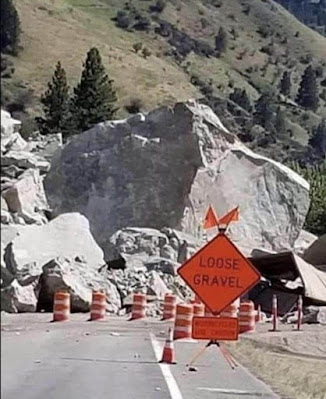Family photo of the week - The Capital Room Bar. Only Cassidy missing, as she is under 18 and not allowed to work in the family's new enterprise in downtown Sanford, Florida. (Currently in "soft opening" stage.)
Left to right: Lionel (Mike's cousin & creative genius behind The Capital Room), Hailey, Susie, Mike, & Riley. Both grandgirls will be servers for the "exotic drinks & tapas" bar.
Below, a truly remarkable pic.
THE DISASTER OF NOT EDITING
This is far from the first time I've expounded on this topic, and it likely won't be the last. But I've been reading a series by an author who is new to me, and wincing and shaking my head while I do it. Yes, the characters are outstanding, the descriptions way above average, the plots intriguing enough to keep me reading (with an "aw-come-on" here and there). But . . .
The day I came across an entire paragraph repeated with but one new paragraph between them, I shook my head and decided it was time to rant and rave. For there is no way even the most cursory reading of the story from top to bottom would not have alerted the author that something was wrong.
I am not going to mention "typos" or missing words below. Every author, even the most diligent at editing, misses a few along the way. The "rule", back when my husband and I were running an educational publishing company well before the days of epub, was: "No matter how carefully a book is edited, it will still go to print with a least three typos."
So what am I talking about?
1. Using a sound-alike word in place of the word that should have been used. A mistake that, when repeated enough times, forces me to suspect the author's interpretation of the words is at fault, and therefore presents the serious problem of inadequate education more than scrambled fingers. (A good example of this occurred on the noon news this week—a TV announcer using "eminent" when she should have said "imminent.")
2. Leaving the "ly" off adverbs, giving the characters in historical novels the distinct flavor of 21st century ghetto-speak.
3. Paragraphing in the middle of someone's dialogue, giving the impression that a new speaker has the floor. Note: if a single person's words are lengthy enough to go to a new paragraph, it must immediately be established the same person is speaking. For example, inserting a simple "Mary (or whoever) continued" in the first sentence.
4. Perfectly awful punctuation, to the point of confusion.
5. Perfectly awful sentence structure, to the point of confusion.
In short, the author of this series has a great imagination but does not have the education to edit his/her own work. He/she needs to hire an English expert to keep from massacring the English language.
Special Grace note: Pardon my inability to adapt to "they/them" for a single person.
Why is following the basic rules of writing important? Because a careless disregard for the language is an insult to the reader. Yes, I understand the author wants to write as fast as possible in order to turn out as many books as possible, and get paid! And, most certainly, authors wince at the cost of hiring an editor. But in the long run, it's worth it to know that not only did you get it right but that if you don't, readers will get tired of wincing over your mistakes and look elsewhere for their reading material. (I recall abandoning a SciFi series because it had so many errors I simply couldn't tolerate it.) In the case of this particular author, I'm hanging in there, hoping someone he/she knows will tell it like it is: YOU NEED AN EDITOR!
In many, many blogs of the past, I have emphasized Do-it-Yourself editing, but every once in a while an author comes along who is truly unable to do that. If you are one of those, then please, pretty please, find someone to check your manuscript so you're not thumbing your nose at the many readers who were paying attention in English class. (Hopefully, you have a friend who might be willing to do it just for the pleasure of reading your book - but not someone who was also snoozing during class.)
Final Grumble: What astonishes me is that in a series that is now several books long, no one seems to have warned the author about the flawed work he/she is presenting to readers; i.e., there has been little improvement. Nobody spoke up? The author simply doesn't care? Or am I merely the fuddy-duddy from another Age who believes the rules of English are there to make better writers of us all? To allow us to write sentences that make sense. To write sentences that sound like the historical period of our setting. To write dialogue that is not confusing. Dialogue where there is no mistake about who is saying what, and when.
Okay, that's it. But if you're a writer and see yourself in the paragraphs above . . . Or a writer who is not confident he/she understands the vocabulary and rules of our language, perhaps it's time to take a closer look . . .
Do. Not. Shoot. Yourself. In. The. Foot. Have respect for what you've written. For your readers and for the future of reading itself. Do not make yourself look foolish by ignoring the rules of the road. Keep in mind the end result could be Crash & Burn.
* * *
THIS WEEK'S FEATURED BOOK
Quite a few years ago, I developed an interest in England's extensive canal network, once the shipping lifeline of the nation, falling into disuse only after World War II. And finally resurrected, with enormous effort, for recreational boating by a determined band of enthusiasts. Narrowboats can now be found along most of the old canals, including those in the heart of London. Some are permanent homes; most are used for weekend meandering. I was fortunate to travel on a narrowboat for a week at the speedy rate of 3 mph, immersing myself in the beauty of the English countryside and feathered wildlife, as well as the fascination of the infinitely slow process of filling or draining a lock. (There were even occasional glimpses of ancient gun emplacements from the 40s.)
My hardcover research was also extensive. I have umpteen canal books & maps on my research shelves. (I even recall e-mailing the Kennett & Avon canal office with a question. Which was promptly answered.) Although I've used this research in several books, I could not have written Lady of the Lock without it. So that is this week's featured novel, a classic Regency set almost entirely on the Kennett & Avon Canal.
The daughter of a canal engineer and a marquess? Heaven forfend!
Against the backdrop of digging the Kennett & Avon canal, a young
woman struggles with a decades-long, and quite impossible, dream of
love.
Thanks for stopping by,
Grace (Blair Bancroft)
















